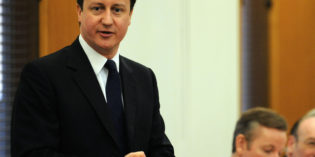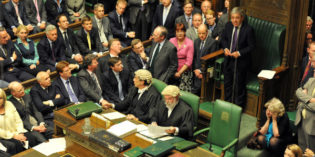Parliament

Book Review: The Coalition Government and Social Policy: Restructuring the Welfare State edited by Hugh Bochel and Martin Powell
The diverse essays included in The Coalition Government and Social Policy: Restructuring the Welfare State, edited by Hugh Bochel and Martin Powell, provide a fascinating and useful contribution to our understanding of recent political history in the UK, argues Mike Pym. The editors’ intention is to ‘locate the coalition’ in the political landscape and uncover the […]

Opponents of populism will never win the argument by defending an unreformed, adversarial 20th century form of democracy
As liberal democracy degenerates into technocracy on the one hand and demagoguery on the other, Claudia Chwalisz writes participatory and deliberative mechanisms are crucial to the defence of a pluralist, tolerant society. Similar PostsThe real reasons referendums have become so common – and so scaryThe slow death of Hungarian popular sovereigntyNativists are populists and not liberalsBook […]

The real reasons referendums have become so common – and so scary
As 23 June nears there has been increasing frustration around the quality of the debate, and the fact that such a complex constitutional issue is being decided by a binary referendum. Harry Farmer considers why referendums are becoming increasingly popular in Western democracies, and why anxieties around votes on single issues reflect deeper worries about […]

Dark Days for the Tories: The implications of the EU referendum for domestic party politics
The referendum debate has revealed deep fissures in the Conservative Party. Sean Swan considers the different scenarios that might follow the vote, and writes that – in or out – it does not seem likely that the losing side will simply accept the referendum result as the end of the matter. Similar PostsDesperate times and […]

How effective is Parliament in controlling UK government and representing citizens?
As part of our 2017 Audit of UK Democracy, Artemis Photiadou and Patrick Dunleavy consider how well the House of Commons functions as a legislature. Is Parliament still an effective focus of national debate and close control of the executive? And how well does the Commons function in scrutinising and passing legislation, or monitoring policy […]

The contemporary Queen’s Speech is more of a wish list than a legislative programme
The Queen’s Speech marks the opening of Parliament, and sees the monarch read our a pre-prepared speech stating the government’s legislative plans. Here, Philip Catney argues that these days, the speech represents more a representation of the government’s aspirations rather than their concrete plans. Similar PostsHow Private Members’ legislation improved local government social valueBook Review […]

What next for the Greens? The Green Party after Natalie Bennett
Natalie Bennett recently announced that she will not seek re-election for a third term as leader of the Green Party. James Dennison evaluates Bennett’s leadership, as well as the impact that the negative press coverage she received had on the party. Thanks to the party’s growing membership under her leadership – having attracted voters from […]

Reforming party funding by stealth and compromise may have longer-term consequences
Since the 2015 general election the government has introduced two measures –proposals relating to trade union political funds and cuts to Short money – that have the potential to affect the funding of at least some political parties. Justin Fisher argues that reforms such as these that have an asymmetric impact on parties could have […]

In the Scottish Parliamentary elections, How many unsuccessful constituency candidates will be elected by regional list?
The electoral system for the Scottish Parliament means that candidates rejected by voters in the constituency section may still find themselves in Holyrood, courtesy of the regional lists. Malcolm Harvey suggests that those very parliamentarians may be called on to address this quirk in the system in the next session. Similar PostsAudit 2017: How democratic […]

The Trade Union Bill 2016 and its likely effect on strike action
Astra Emir considers the impact the Trade Union Bill currently making its way through the Lords would have if it came into force. She writes that although the Bill could well limit the number and effect of strikes as the Government hopes, there may be other consequences, for example in terms of unions using leverage to escalate disputes […]


 Democratic Audit's core funding is provided by the Joseph Rowntree Charitable Trust. Additional funding is provided by the London School of Economics.
Democratic Audit's core funding is provided by the Joseph Rowntree Charitable Trust. Additional funding is provided by the London School of Economics.